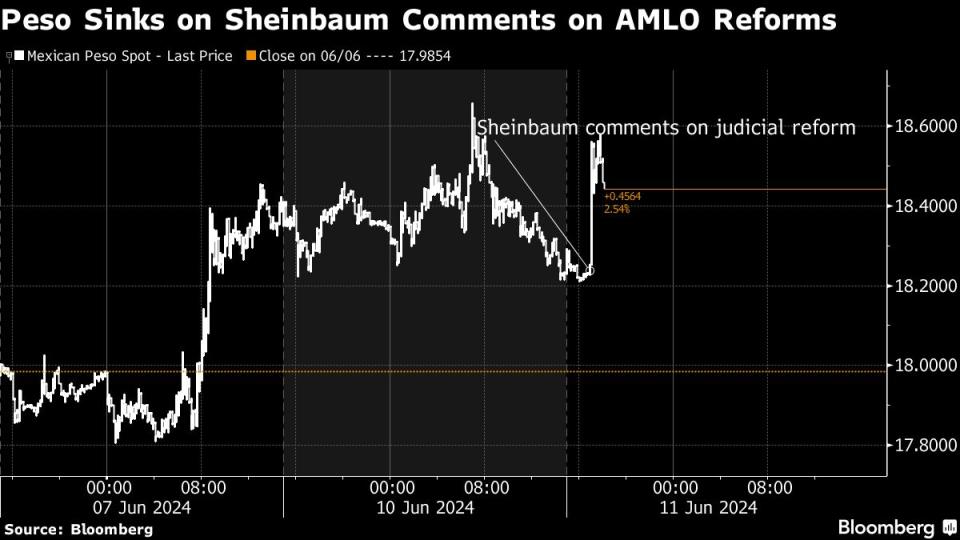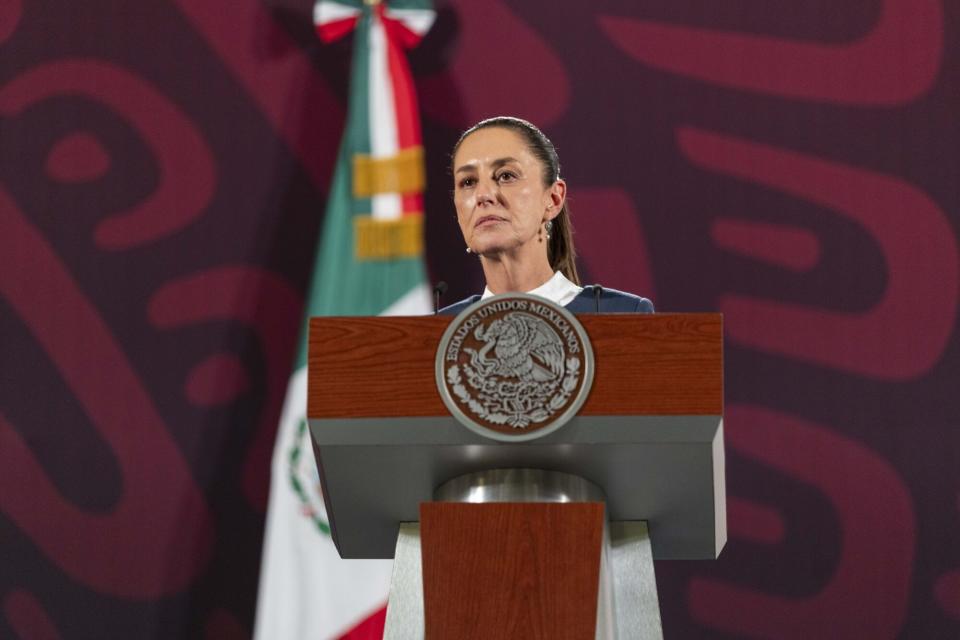Mexico’s Peso Sinks as Sheinbaum Embraces Judicial Reform
(Bloomberg) -- Mexico’s peso sank after President-elect Claudia Sheinbaum said a proposed reform of the nation’s judicial system would be among the first to be discussed in congress, spooking investors who worry it will erode checks on the ruling party.
Most Read from Bloomberg
Dozens of CVS Generic Drug Recalls Expose Link to Tainted Factories
Stocks Rise as Solid Treasury Sale Spurs CPI Bets: Markets Wrap
A constitutional reform to the judiciary system will be part of a group of legislative projects left over from President Andres Manuel Lopez Obrador’s administration that she supports moving forward during the political transition, Sheinbaum said following a meeting with the outgoing president. She added that she would propose for the programs to be debated widely, not just by Congress but also by academics and civil society groups.
“There should be a wide discussion in the months before the new congress begins,” Sheinbaum said during a news conference late on Monday, adding that she wanted the controversial judicial reform to be discussed by “bar associations, the law schools, the judges, and the workers of the judiciary.”
The currency fell as much as 1.8% to 18.58 per dollar in early Asia trading following her comments. It was 0.7% weaker at 9:50 a.m. in New York.
The peso has slumped more than 8% after the ruling coalition had a stronger-than-expected performance in congressional elections, ratcheting up investor fears lawmakers could pass a series of controversial constitutional changes. The judicial reform would put judges elected by popular vote on the nation’s Supreme Court and other lower courts, potentially changing the balance of power in Mexico.
The peso has “overreacted” to the election result, JPMorgan Chase & Co said in a research note, recommending investors to stick to long positions.
Other reforms to be included in a first wave of legislation to address include a reform to the ISSSTE’s pension plan for public workers and a ban on reelection to public office, Sheinbaum said. Lopez Obrador agreed with the proposal for a discussion process that involved a broad swath of the Mexican public, she added.
“The market was hoping that she would distance herself from President Lopez Obrador because there is a possibility that her mandate could be seen as an extension of his six-year term,” said Gabriela Siller, an economist at Mexico’s Banco Base. The peso could go to 20 per dollar on expectations reforms would disrupt the business climate in the country, she added.
Instead of trimming down the number of reforms, Sheinbaum added new ones — a women’s assistance program and one to support schoolchildren — and insisted that they would be among the first priorities. Other reforms that had raised concern among investors, such as one that would eliminate some independent regulatory bodies, would be discussed at a later time, Sheinbaum said.
Sheinbaum spoke from the podium at the National Palace in Mexico City in which Lopez Obrador typically holds his hours-long daily press conferences. The outgoing president didn’t participate in the press conference, and the incoming leader did not confirm whether she would carry on his tradition of morning pressers once she enters office.
She added that she will name her cabinet next week. She also said she plans to receive a US delegation on Tuesday at her campaign headquarters, and that she’s not currently planning a trip to Mexico’s northern neighbor.
Priority Reforms
Another point of tension among investors has been whether the new Congress, which begins its legislative period on Sept. 1, would rush through reforms before Sheinbaum transitions into her role as president on Oct. 1. She said the goal was for the set of priority reforms to start being discussed in September, without clarifying when they might be voted on.
Asked whether authorities are concerned about the volatility in the currency, Sheinbaum said that she didn’t expect the discussion process for the reforms would lead to additional volatility.
Sheinbaum added that she would soon discuss the plan for 2025 with Finance Minister Rogelio Ramirez de la O, who will remain in his post at the start of her term.
Earlier on Monday, in an bid to allay investor concerns, Senate Majority Leader Ricardo Monreal said that the ruling party will keep markets in mind as it moves to discuss constitutional reforms.
“Most likely, in the short term, if this rhetoric continues, the peso will remain volatile,” said Miguel Iturribarria, a strategist at BBVA Mexico. “We could see an increase in the risk premium, not only for the peso but also for other local assets.”
--With assistance from Matthew Burgess.
(Updates with peso decline in fourth paragraph, adds JPMorgan’s recommendation in sixth.)
Most Read from Bloomberg Businessweek
China’s Economic Powerhouse Is Feeling the Brunt of Its Slowdown
As Banking Moves Online, Branch Design Takes Cues From Starbucks
Food Companies Hope You Won’t Notice Shortages Are Raising Prices
Legacy Airlines Are Thriving With Ultracheap Fares, Crushing Budget Carriers
©2024 Bloomberg L.P.

 Yahoo News
Yahoo News 



